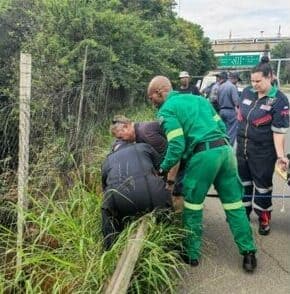Selecting the correct career is a crucial decision with far-reaching implications. It is a choice that will shape your future, underscoring the importance of making an informed decision.
The African Reporter continues to engage with business people, professionals and other role players, focusing on a specific career every week.
By doing this, we aim to provide valuable guidance to our younger readers navigating their career choices. This week, we give a platform to the pharmacist career.
Kayla Roux has been a pharmacist for four years and has always been passionate about science and helping people.
“Pharmacy felt like the perfect balance between the two. It’s a field where I can apply my love for medical science in a way that makes a real difference in people’s lives.
“What drew me in even more was pharmacists’ unique position in healthcare. Sometimes, we are the first person a patient turns to when they are unsure, anxious or cannot reach a doctor. Other times, we are the last checkpoint before treatment begins.
“Either way, we are trusted to ensure medicines are safe, appropriate and understood. I love being that accessible, knowledgeable support system, empowering patients and protecting their health,” she said.
She advised aspiring pharmacists to go for it. “Just know that the profession requires heart and hard work. Pharmacy is a beautiful mix of science, service and heart. If you are thinking about this path, know that you do not have to have all the answers now, just the willingness to grow.
“Stay humble and passionate, and always remember, patients aren’t just looking for pills; they’re looking for someone who cares.”
What is pharmacy?
Pharmacy is where science meets caring. It is a health science that connects chemistry and medicine to help people live healthier lives. Pharmacists are involved in discovering, making, controlling and providing medicines, ensuring they are safe, effective and used correctly.
What is a pharmacist?
A pharmacist is a qualified healthcare professional and your go-to medicine expert – part scientist, part counsellor and part superhero with a white coat. We do not just pack pills; we ensure what you take is safe, right for you and will not clash with your auntie’s herbal tea. We are the custodians of medicine.
What does a pharmacist do?
Pharmacists play a vital role in healthcare. Our work goes far beyond handing out medicine. Here’s what we do:
• Review prescriptions: We carefully check prescriptions to ensure they are appropriate, safe and legal, even when the doctor’s handwriting is a challenge;
• Verify medication accuracy: We confirm that each patient receives the correct medicine in the correct dose, strength and form, tailored to their specific condition;
• Provide patient counselling: We teach patients how to correctly take their medication – when to take it, with or without food, what to avoid and how to store it;
ALSO CHECK: Embrace the twists and turns of your learning journey: Becoming a midwife
• Monitor for interactions and side effects: We assess patient profiles to identify and prevent harmful drug interactions or side effects, especially when patients are on multiple therapies;
• Collaborate with healthcare teams: We work closely with doctors, nurses and other healthcare professionals to support optimal treatment plans, adjusting therapies where needed;
• Promote safe and rational medicine use: We educate patients and health professionals on the safe, effective, and responsible use of medication, including antibiotics and chronic therapies.
In short, we ensure medicines work the way they should – safely, effectively and with the patient’s best interest at heart.
Where can I study to become a pharmacist?
To become a pharmacist, one must pursue a Bachelor of Pharmacy (BPharm) degree at a university. Some great options in SA include:
• North-West University;
• University of Pretoria;
• University of the Witwatersrand;
• Rhodes University;
• University of the Western Cape;
• Nelson Mandela University.
How long does it take?
Becoming a registered pharmacist in SA typically takes six years:
• Four years for a BPharm degree;
• One year of internship;
• One year of community service (compulsory).
What high school subjects do I need?
You must have completed these subjects in high school:
• English (home language or first additional language), level five;
• Mathematics, level five;
• Life sciences and/or physical sciences, level five.
What is the difference between a pharmacist and a pharmacist assistant?
• A pharmacist makes all the clinical decisions and is fully responsible for all activities in a pharmacy;
• A pharmacist assistant helps with dispensing, stock control and patient service, all under the supervision of a pharmacist.
Both roles are vital.
ALSO CHECK: Embrace the twists and turns of your learning journey: Becoming an entrepreneur
What are a pharmacist’s roles?
• Accurately dispensing medications;
• Providing patient counselling;
• Monitoring for side effects and drug interactions;
• Ensuring legal and ethical pharmacy practices;
• Participating in health promotion and public health initiatives;
• Leading antimicrobial stewardship and rational medicine use.
What skills do I need to become a pharmacist?
You must be:
• detail-oriented;
• a good communicator (dealing with doctors, patients and everyone in between);
• a problem-solver;
• empathetic;
• able to work under pressure;
• passionate about science and helping people.
What are your biggest challenges?
• Medicine stock shortages (a pharmacist’s nightmare);
• Long queues and not enough staff, and limited resources;
• Patients mixing meds with home remedies (and not telling us);
• Ensuring the rational use of antibiotics to prevent resistance.
But we survive with humour and teamwork.
How do you ensure accuracy when handling prescriptions?
• Follow the five rights: Right patient, right drug, right dose, right route, right time;
• Double-check calculations and medicine labels;
• Use standard operating procedures;
• Maintain clear communication with doctors and patients;
• Most importantly, no distractions when dealing with meds.
ALSO CHECK: Embrace the twists and turns of your learning journey: Becoming an environmental health safety officer
Are there different types of pharmacists?
Yes. We are a squad:
• Community pharmacist: Your local go-to in retail pharmacies, dispensing medicines, offering health advice and being the most accessible healthcare professional;
• Hospital pharmacist: Works in hospitals, managing drug distribution, ensuring medication safety and providing clinical support to healthcare teams;
• Clinical pharmacist: Specialises in direct patient care, often in hospital wards or clinics. They work closely with doctors to optimise treatment plans, monitor therapies and adjust medications based on clinical outcomes;
• Industrial pharmacist: Works in pharmaceutical companies involved in drug development, manufacturing, quality control and regulatory affairs;
• Academic pharmacist: Involved in teaching, training and research to help shape the future of pharmacy;
• Regulatory pharmacist: Works at institutions like the South African Health Products Regulatory Authority, ensuring medicines meet national safety, quality and efficacy standards. They also work at pharmaceutical companies to ensure all medicines adhere to local guidelines;
• Oncology pharmacist: Specialises in providing medication management and support to cancer patients;
• Quality assurance pharmacist: Ensures pharmaceutical products’ safety, quality and efficacy throughout their lifecycle. They establish and maintain standards, implement quality control processes and ensure compliance with regulations;
• District pharmacist: Ensures the availability and correct management of medicines in the community. Each type plays a crucial role in the bigger picture of healthcare delivery.
Where do pharmacist assistants work?
They typically work in:
• pharmacies;
• clinics;
• hospitals;
• pharmaceutical warehouses or depots.
At Caxton, we employ humans to generate daily fresh news, not AI intervention. Happy reading!
Stay in the know. Download the Caxton Local News Network App here.



